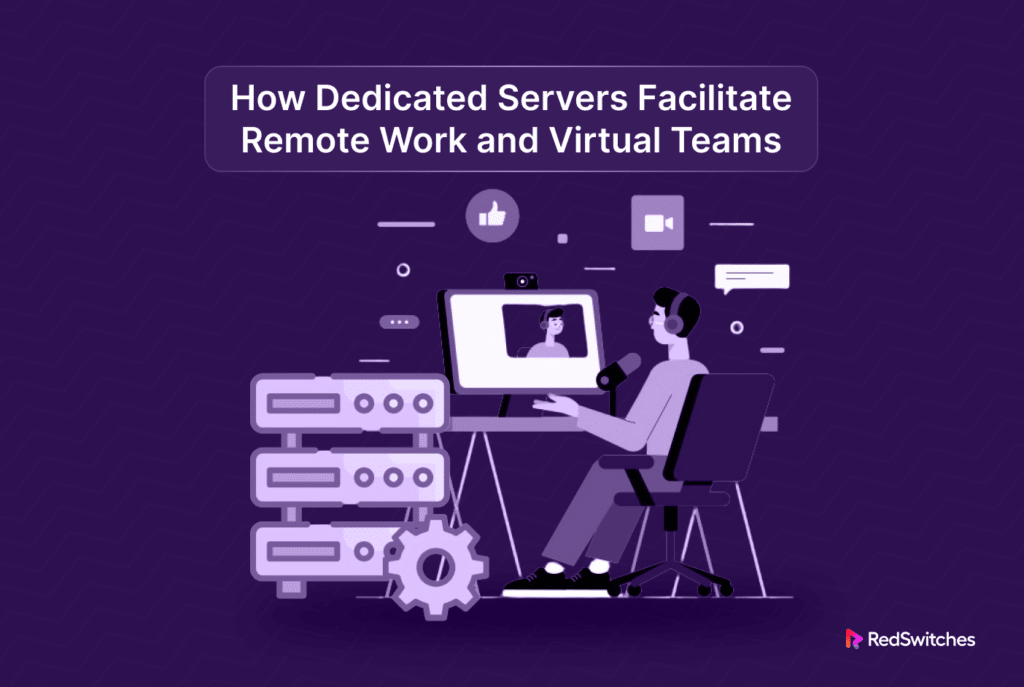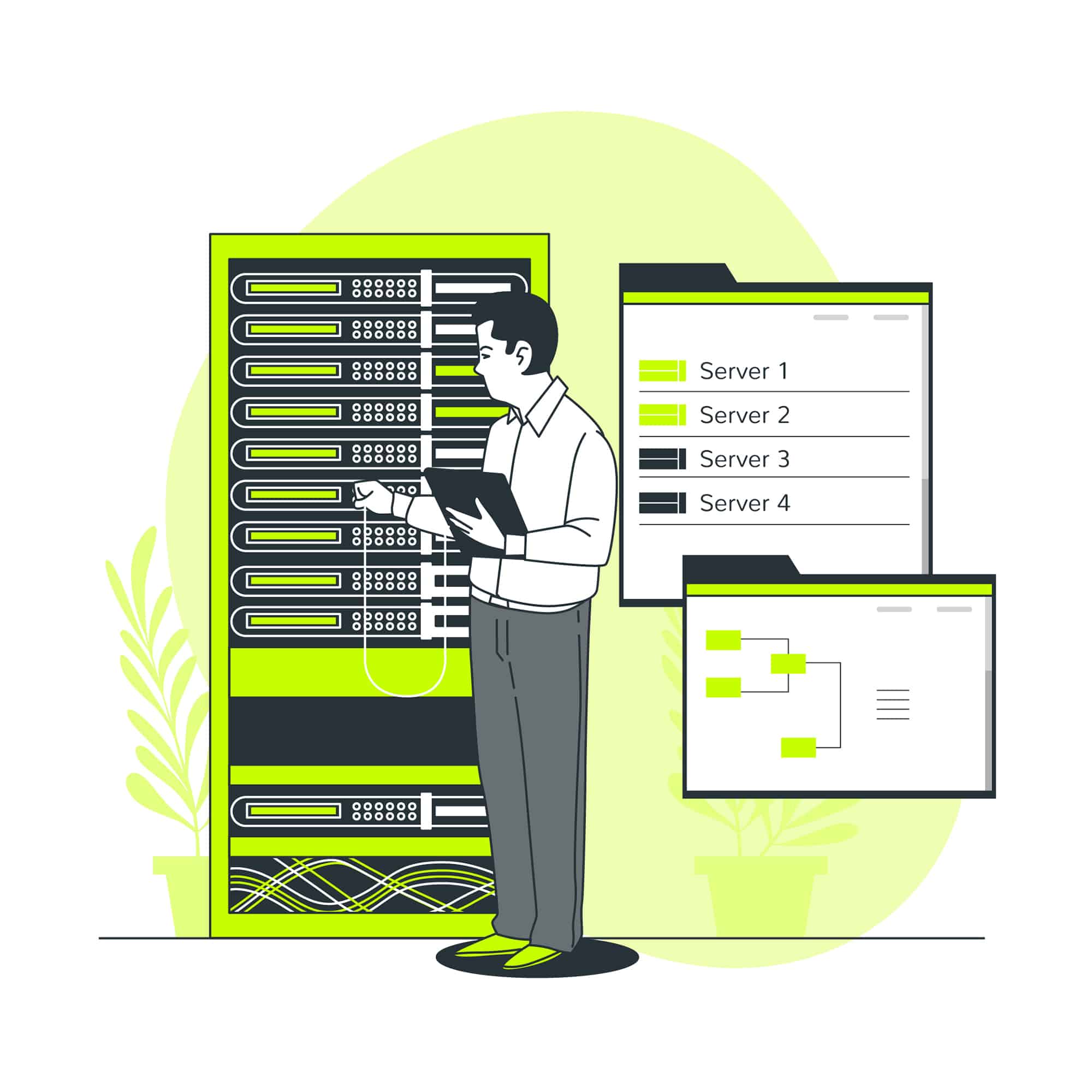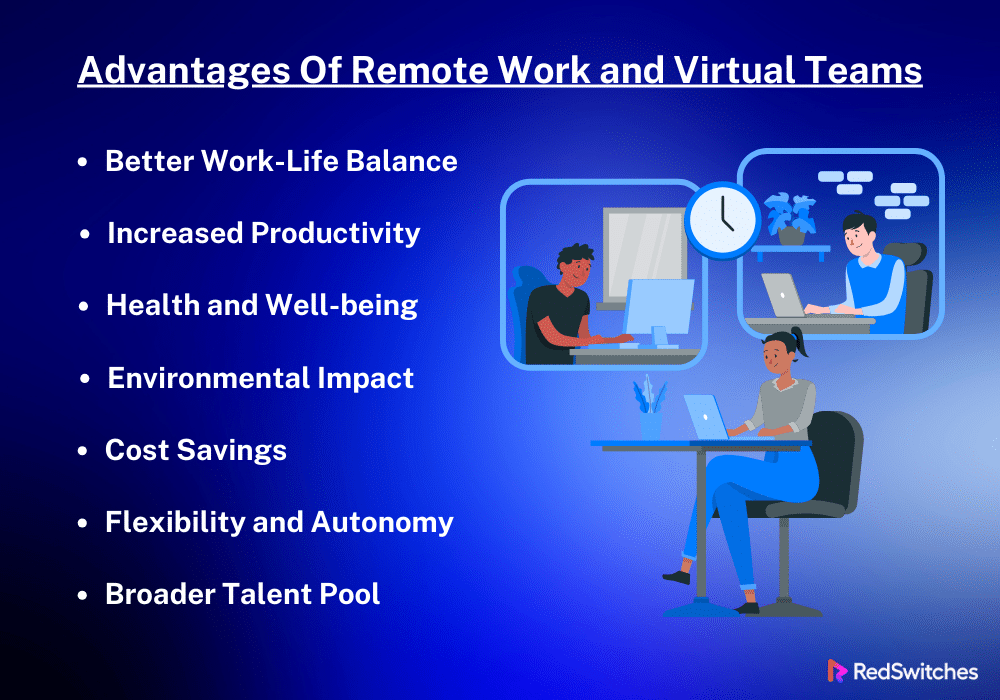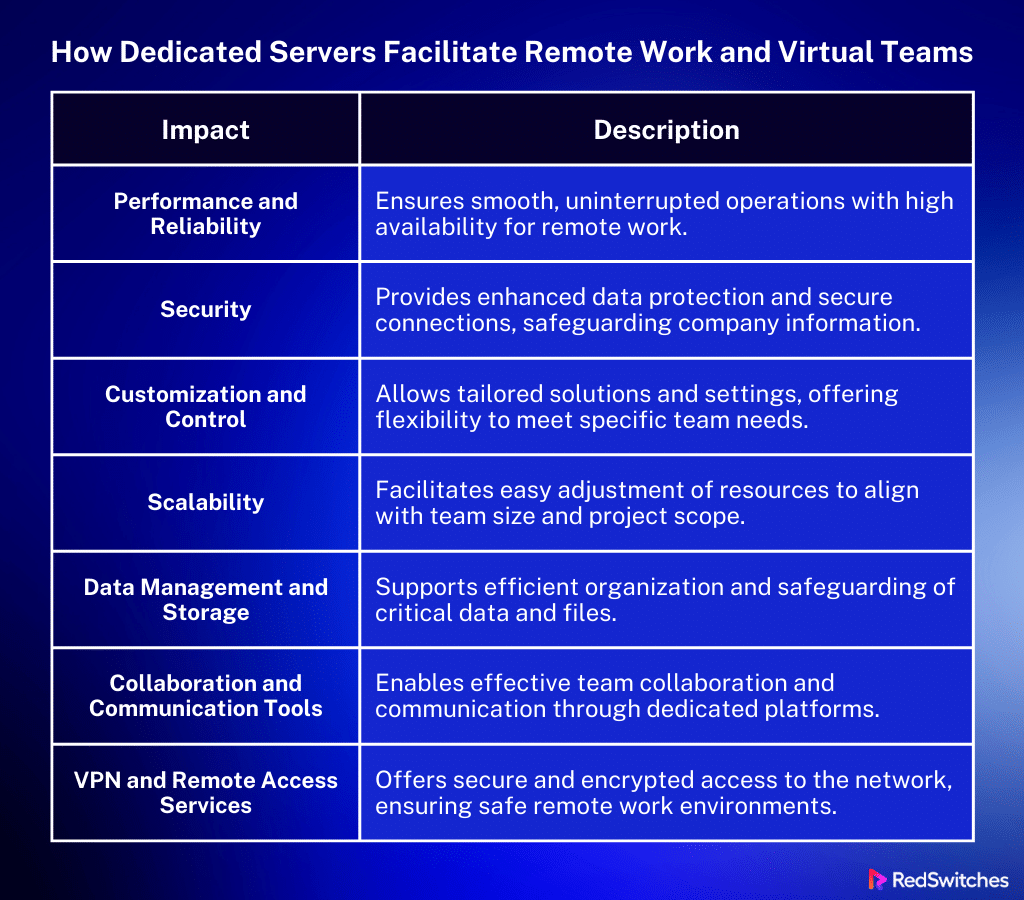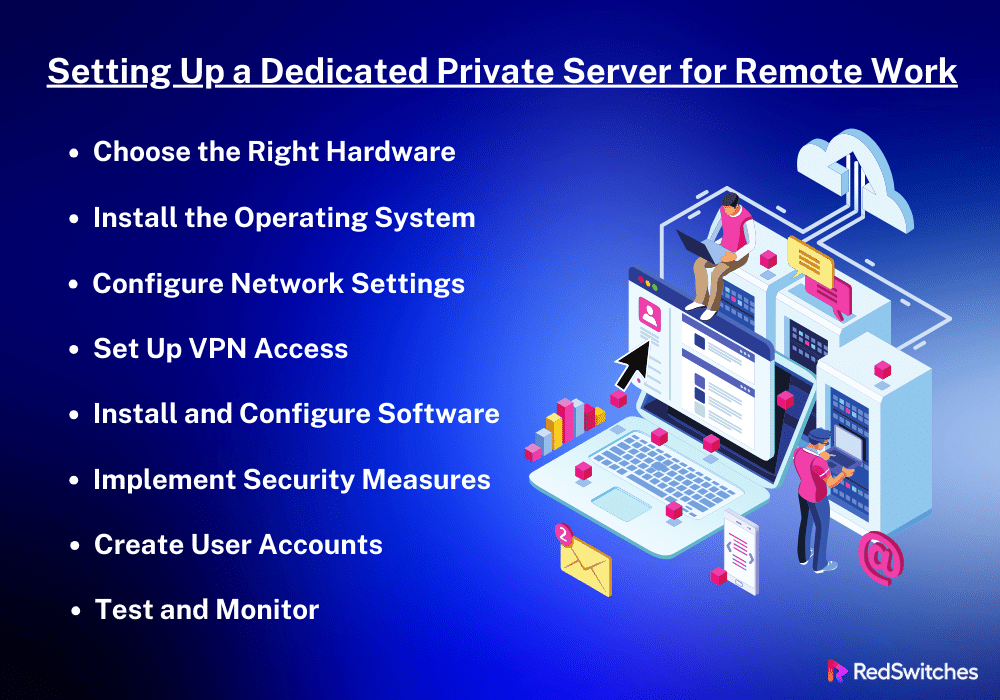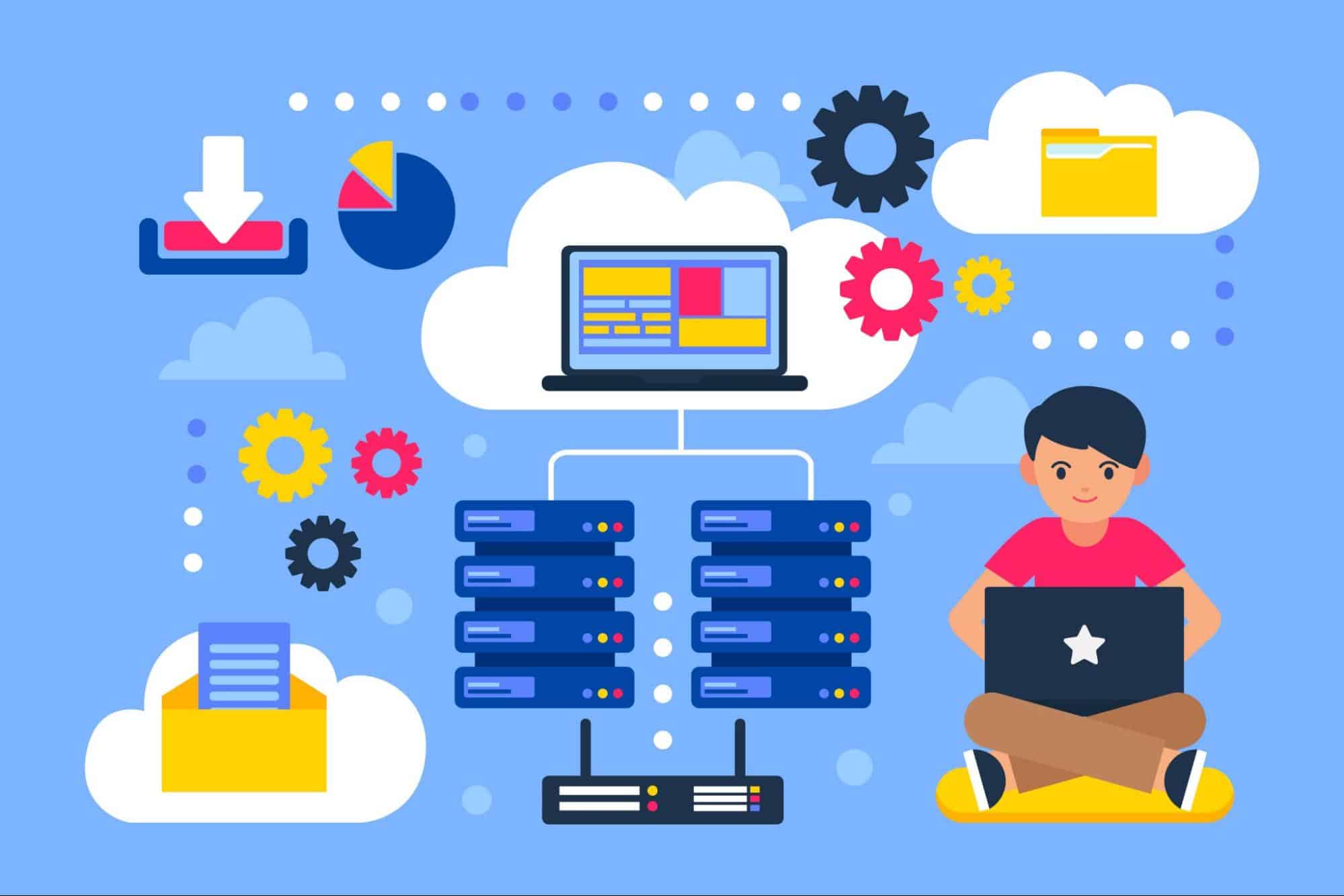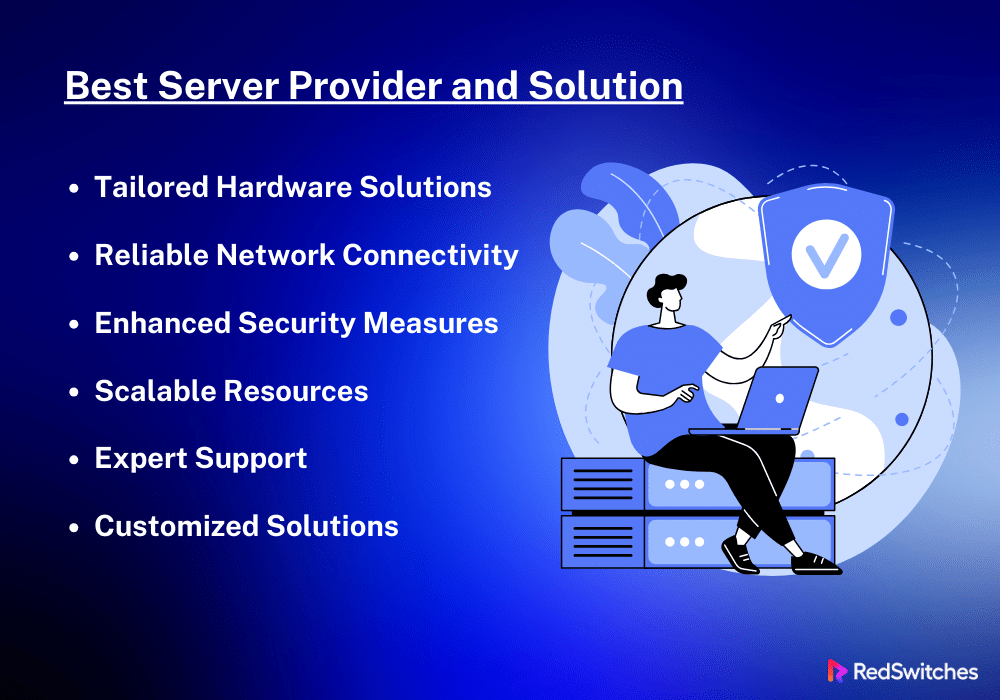Key Takeaways
- Dedicated servers are essential for the evolving landscape of remote work, providing a secure and efficient platform for virtual teams.
- These servers offer exclusive resources like CPU, RAM, and storage, ensuring better performance and control for businesses.
- Key benefits include enhanced security, customization options, and the ability to handle high workloads, crucial for remote operations.
- Technological advancements drive remote work’s popularity, the demand for flexibility, and the desire for a better work-life balance.
- Dedicated hosted servers support essential tools for collaboration and communication, making remote teamwork seamless and productive.
- They enable secure VPN and remote access, ensuring team members can safely access necessary resources from anywhere.
- Choosing the right dedicated hosted server involves considering performance needs, reliability, security features, and scalability to support growth.
- Setting up a server requires selecting appropriate hardware, configuring network settings, and implementing robust security measures.
- The future of remote work will see more scalable, secure, and performance-oriented servers, focusing on sustainability and cloud integration.
- RedSwitches stands out as a provider offering customized, secure, and scalable dedicated hosted server solutions tailored to support remote work and virtual teams efficiently.
In recent years, the way we work has changed a lot. More people are working from home or other places outside the traditional office. This shift has made it important for businesses to have strong tech support. Dedicated servers are a big part of this. They are special computers that only one business uses at a time. This setup offers better security, faster performance, and more control over the digital workspace.
A dedicated hosted server is like a powerhouse for remote work. It lets team members access what they need, like files and apps, no matter where they are. This helps everyone stay connected and keeps work flowing smoothly. 56% of hiring managers report that the transition to remote work has exceeded their expectations, while just 10% believe it has fallen short of what they anticipated. This shows the importance of reliable tech, like dedicated hosted servers.
Choosing the right server can seem tricky. But it comes down to what your team needs to do great work. Things like speed, storage, and safety are key. With the right setup, getting started can be easy. Plus, knowing your team’s work remains secure brings peace of mind.
In short, servers are vital in supporting remote work and virtual teams. They provide the essential tech backbone that keeps businesses running smoothly, no matter where the team is located.
Table of Contents
- Key Takeaways
- What Are Dedicated Servers?
- What Is Remote Work?
- What Are Virtual Teams?
- Why are Remote Work and Virtual Teams Becoming So Popular?
- Advantages Of Remote Work and Virtual Teams
- How Dedicated Servers Facilitate Remote Work and Virtual Teams
- Choosing a Dedicated Hosted Server for Remote Work And Virtual Teams
- Setting Up a Dedicated Private Server for Remote Work
- Future of Remote Work and Dedicated Hosted Servers
- Best Server Provider and Solution
- Wrapping Up
- FAQs
What Are Dedicated Servers?
Credits: Freepik
Dedicated private servers are like exclusive homes for websites and applications on the internet. Unlike shared hosting, where many websites live together on one server, a server is reserved for just one user or business. You don’t share resources like CPU, RAM, or storage space with anyone else. It’s all yours.
Why Choose a Dedicated Server?
The main reasons to choose a server are performance, security, and control. Since you’re not sharing resources, your website or application can run more smoothly. It’s faster and more reliable. For businesses that handle sensitive information, servers offer better security. You can set up your security measures to protect your data. Also, you have full control over how the server is set up. You can choose the software and settings that best fit your needs.
Performance and Reliability
Dedicated private servers provide top performance. They can handle lots of traffic and heavy workloads. This is great for websites or applications that need to be fast and always available.
Security and Control
With a server, you’re in charge of security. This is very important for businesses that deal with private information. You can add firewalls, security software, and more. Plus, you have complete control over the server’s setup. You can install any software you need and configure it just how you want.
Servers offer a powerful, secure, customizable option for hosting websites and applications. They’re ideal for businesses that need the best performance, top-notch security, and full control over their online presence.
What Is Remote Work?
Credits: Freepik
Remote work means doing your job from somewhere other than a traditional office. This could be from home, a coffee shop, or anywhere with an internet connection. It’s a flexible working method that has become more popular.
Flexibility and Freedom
One of the biggest perks of remote work is its flexibility. You can often set your hours and work in a way that fits your life. This can make balancing work and personal life easier.
The Role of Technology
Technology plays a big part in making remote work possible. Tools like video calls, messaging apps, and cloud services help teams stay connected and work together, even when they’re far apart.
Empowering Companies and Workers
Remote work can benefit companies and their employees. Workers save time and money by not commuting and can work in a comfortable, personalized space. Companies can save on office space and have access to a broader pool of talent.
In summary, remote work is a way of working that lets people do their jobs from anywhere. It relies on technology to keep teams connected and can offer benefits like flexibility, savings on commuting, and a better work-life balance.
Also Read The Advantages of Virtualization in Server Environments
What Are Virtual Teams?
Credits: Freepik
Virtual teams are groups of people who work together from different locations. They use the internet to communicate and collaborate. Unlike traditional teams, virtual team members might never meet in person. They rely on digital tools for meetings, sharing documents, and completing projects.
Key Features of Virtual Teams
- Location Independence: Team members can be in different cities or countries. They don’t need to be in the same office to work together.
- Digital Communication: Team members communicate via emails, video calls, and chat apps.
- Flexible Schedules: People in virtual teams often work at different times. They can adjust their schedules to fit their lives better.
- Diverse Teams: Virtual teams can include people with different skills, backgrounds, and cultures. This diversity can lead to more creative ideas and solutions.
Why Virtual Teams?
Credits: Freepik
Virtual teams allow businesses to find the best talent, no matter where they live. They also let people work in a way that suits them best. For companies, this can mean happier employees and better work. For employees, it offers a chance to balance work with other parts of their lives.
In conclusion, virtual teams are a modern way to organize work. They use technology to bridge the gap between different locations. This allows for flexibility, diversity, and collaboration across distances. Virtual teams can be as effective as traditional ones, sometimes even more so. They show how work is changing in the digital age.
Why are Remote Work and Virtual Teams Becoming So Popular?
Credits: Freepik
Remote work and virtual teams have become buzzwords in today’s job market, and their popularity is soaring. This change is driven by technological advancements and a shift in how people view work-life balance.
Technology Makes It Easy
First, technology has made remote work easier than ever. High-speed internet and cloud-based tools let us share files and communicate instantly. This means that teams can work together no matter where they are.
Desire for Flexibility
People now seek more balance in their lives. They want to work in ways that fit their schedules and personal commitments. Remote work and virtual teams allow for this flexibility. Employees can often set their hours and work from comfortable places.
Access to Global Talent
For businesses, virtual teams open up the world. They can hire the best talent, no matter where they live. This helps companies build strong teams that bring diverse perspectives and skills.
Cost Savings
There are also financial benefits. Companies can save on office space and other overhead costs. Employees save on commuting costs and time. This can make a big difference in people’s lives and budgets.
Advantages Of Remote Work and Virtual Teams
The rise of remote work and virtual teams benefits employees and employers.
Better Work-Life Balance
Remote work lets people manage their work and personal life more effectively. They can work around family commitments or personal projects. This balance can lead to happier, more productive employees.
Increased Productivity
Many find they’re more productive when working remotely. Fewer office distractions and the ability to create a personal work environment contribute to this increase.
Health and Well-being
Employees have more time for exercise, hobbies, or rest without commuting. This can improve overall health and well-being.
Environmental Impact
Less commuting means fewer cars on the road. This reduces traffic congestion and pollution, benefiting the environment.
Cost Savings
Remote work can lead to significant cost savings for employers and employees. Companies save on office space and utilities. Employees save on commuting costs and often spend less on food and clothing.
Flexibility and Autonomy
Remote work offers flexibility. People can work when they are most productive, whether early morning or late at night. This autonomy can lead to more efficient work and greater job satisfaction.
Broader Talent Pool
For companies, virtual teams mean access to a global talent pool. They can find the best person for the job, no matter where they live. This can lead to more innovative and effective teams.
In conclusion, the popularity of remote work and virtual teams is driven by technology, a desire for flexibility, and the benefits they offer. From improved work-life balance to environmental impacts, the advantages are clear. As technology evolves, we can expect remote work and virtual teams to become even more integral to our work.
Also Read Fiverr vs Upwork: Choosing the Best Freelancer Platform in 2024
How Dedicated Servers Facilitate Remote Work and Virtual Teams
Today, many people work from different places, not just from an office. Dedicated private servers help make this possible. Think of these servers as special computers that let everyone in a team work together smoothly, no matter where they are. They keep all the team’s work safe and make sure everything runs fast and without problems. This way, working from home or in a coffee shop, they can do their job well.
Dedicated private servers are like the strong, silent type that ensures everyone can finish their work without fuss. They’re important for teams that aren’t all in the same place.
Performance and Reliability
Having a strong and reliable online setup is key when discussing working from home or being part of a team that’s spread out everywhere. This is where dedicated hosted servers come into play. They are like the strong foundation of a house but for your work on the internet. They make sure that everything runs smoothly and without any hitches.
Solid as a Rock
Dedicated hosted servers are known for being reliable. This means you won’t have to worry about your internet slowing down or stopping when you’re working. Everything works well, allowing you to focus on tasks without stress about tech issues.
Always There When You Need It
These servers are constantly up and running. They don’t take breaks or need naps. Whether it’s the middle of the night or early in the morning, you can count on them to be there for you. This is great for teams that work in different time zones. Everyone can work when it’s best for them.
Quick and Responsive
Performance is another big win. Dedicated hosted servers are fast. This speed makes it easier to get your work done. You can share files, have video meetings, and access big documents quickly. There’s no waiting around for things to load. This keeps the work flowing and ensures teams can work together well, even if they’re not in the same place.
In short, servers make remote work and being part of a virtual team much easier. They give you a strong, reliable place to do your work online. This means less worrying about technical problems and more time getting things done.
Security
Credits: Freepik
Keeping data safe in remote work and virtual teams is a big deal. Dedicated hosted servers come in strong here, offering top-notch security. They help make sure that all the work done from afar stays protected.
Your Own Secure Space
Think of a dedicated hosted server as a private room for your team’s digital stuff. Unlike shared spaces, where you’re with many others, this room is just for you. This setup reduces the chances of unwanted guests. It’s like having a safe where only you know the combination.
Strong Doors and Locks
Dedicated hosted servers have strong security measures. They can have firewalls like big walls that keep out internet troublemakers. These servers can also use encryption. Encryption scrambles data so only people with the right key can read it. Even if someone unwanted grabs the data, they won’t understand it.
Keeping Watch
Another cool thing about servers is that someone can always watch over them. If something odd happens, it can be caught and fixed quickly. It’s like having a security guard for your digital space.
Up-to-date Protection
These servers get regular updates to fight off new threats. It’s important to stay ahead in the game of internet security. Dedicated hosted servers make this easier by allowing quick updates to keep everything safe.
Dedicated private servers offer a secure foundation for remote work and virtual teams. They provide a private, protected space on the internet. With strong security measures, constant monitoring, and the ability to stay up-to-date against threats, servers help keep your digital work safe and sound. This peace of mind is priceless for teams across different locations, ensuring their focus remains on productivity and collaboration, not worrying about security risks.
Customization and Control
Regarding remote work and virtual teams, setting things up just right is key. This is where dedicated private servers shine. They offer customization and control you won’t find with other options. This means teams can work in a way that fits them perfectly.
Tailor-Made Solutions
You can set things up exactly as needed with a dedicated private server. This is like building your own office from the ground up. You choose the tools, the layout, and how everything works together. This custom-fit makes everything more efficient and easier to use.
In Charge of Your Space
Having control over your server is a big plus. You decide on the security settings, what software to install, and how to manage data. It’s like having the keys to your digital building. This control means you can quickly adapt to new challenges or changes in your team’s work.
Grow as You Go
Another great thing about servers with dedicated resources is that they can grow with you. As your team or needs expand, you can add more resources. This could mean more storage, faster speeds, or new tools. It’s like being able to add more rooms to your office as you hire more people.
Servers with dedicated resources offer customization and control ideal for remote work and virtual teams. They let you set up your digital workspace just how you like it, making it easier for everyone to finish their work. This flexibility and adaptability are essential in today’s fast-moving work environments, ensuring your team can stay productive and focused on what matters most.
Scalability
Scalability is a big word for remote work and virtual teams. It means being able to grow or shrink your resources based on what you need. Servers with dedicated resources are stars in this area. They let businesses adjust quickly, making sure teams always have the right tools at their fingertips.
Growing Without Pain
Think of your team like a plant. Just as a plant needs more room to grow, your team might need more digital space or power as it expands. Dedicated private servers make this easy. As your needs change, you can add more storage, processing power, or bandwidth. This is like moving your plant to a bigger pot so it can keep growing.
Flexibility for the Future
The future is always a bit unknown. A project might bring in more people or require more data. With a server, you can prepare for whatever comes your way. It’s like having a backpack you can fill with more supplies as your journey gets longer.
Keeping Costs in Check
Scalability also means managing costs better. You only pay for what you use. You can scale down if your team gets smaller or a project ends. This way, you’re not spending money on resources you don’t need. It’s like turning off the lights in a room you’re not using.
In short, scalability is about flexibility and efficiency. Servers with dedicated resources offer both, making them a perfect fit for the dynamic needs of remote work and virtual teams. They support growth and change, ensuring businesses adapt quickly without breaking the bank. Servers are invaluable in today’s ever-changing work environment, helping teams stay agile and responsive despite challenges.
Data Management and Storage
Credits: Freepik
Data and storage are key to working remotely and running virtual teams. Servers with dedicated resources play a huge role here. They provide a secure and efficient place to store all the digital stuff a team needs. This includes files, applications, and databases.
Safe and Sound
With servers, your data is stored safely. These servers can have backups and recovery plans. You can get back on track quickly if something goes wrong, like data loss or a system crash. It’s like having a safety net for your digital work.
Room to Grow
As your team takes on more projects, you’ll have more data. Servers make it easy to handle this growth. You can add more storage space as needed. This flexibility helps you meet your team’s needs without hitting any limits.
Quick Access
Speed is important when working with a lot of data. Servers provide fast access to your files and applications. This means less waiting around for things to load. Everyone on the team can get what they need when needed, which keeps projects moving smoothly.
Dedicated hosted servers offer powerful solutions for data management and storage. They ensure your data is safe, easy to access, and can grow with your team. This makes servers a key support for remote work and virtual teams, helping them work efficiently without worrying about their digital space.
Collaboration and Communication Tools
Credits: Freepik
In remote work and virtual teams, talking and working together online is essential. Dedicated private servers play a big role in this. They host the tools that teams use to communicate and collaborate. This makes working from different places smooth and efficient.
Keeping Teams Connected
Servers can run communication tools like email servers, chat apps, and video conferencing systems. This is like having a private phone line that’s always clear and ready. It means messages get sent quickly, and meetings happen without glitches.
Sharing and Working Together
These servers also host platforms where teams can work on documents simultaneously or share big files. It’s like having a big table where everyone can share their work, see what others are doing, and help. This sharing happens in real time, without waiting for files to be sent or downloaded.
Safe and Private
Because the server is dedicated, all this communication and collaboration is private and secure. It’s like having conversations and meetings in a secure room where no one else can listen in. This keeps your team’s work and ideas safe from outsiders.
Custom Setups
Teams can set up their tools exactly how they want them on a dedicated hosted server. This means they can choose the best software for their needs and customize settings to fit their workflow. It’s like custom-building a workshop with all the right tools in the right places.
Servers support remote teams’ tools to talk and work together. They ensure that communication is quick, collaboration is easy, and everything is secure. This lets teams work together smoothly, no matter where they are and keeps projects moving forward without a hitch.
VPN and Remote Access Services
VPN and remote access services are vital for remote work and virtual teams. Servers with dedicated resources play a key role in providing these services. They help create secure and private connections over the internet. This lets team members safely access their work from anywhere.
Secure Connections
A VPN, or Virtual Private Network, on a server creates a secure tunnel for data. It’s like sending information through a private tube that no one else can see into. This keeps the data safe from hackers and prying eyes.
Easy Access to Work
Remote access services on servers let team members access their work files and applications just like they would in the office. It’s as if they have a key to the office door, no matter where they are. This makes working from home or any other place easy and secure.
Keeping Data Safe
These services also protect the company’s data. Since the connection is encrypted, sensitive information stays safe. It’s like locking your valuables in a safe, even when sending them through the mail.
Customizable for Teams
Servers with dedicated resources allow companies to set up VPN and remote access in a way that fits their needs. They can choose the level of security and access different team members have. It’s like customizing each key to open only certain doors.
In short, VPN and remote access services on servers are essential for secure and efficient remote work. They ensure that team members can safely access what they need, when needed, no matter where they are. This supports the flexibility and mobility that modern workforces need, keeping everyone connected and productive.
Also read The Role of Dedicated Servers Hosting in High-Traffic Websites in 2024
Choosing a Dedicated Hosted Server for Remote Work And Virtual Teams
Credits: Freepik
Choosing the right server for remote work and virtual teams is crucial. It ensures that your team can work efficiently and securely from anywhere. Key factors to consider:
Performance Needs
Start by assessing the workload. Think about the tasks your team performs and the software they use. High-traffic websites, large databases, and intensive applications require powerful servers. Look for servers with robust processors, ample RAM, and fast SSD storage. This ensures smooth operation without lag.
Reliability
Your dedicated private server must be reliable. Downtime means lost productivity and potentially lost business. Look for a provider with a strong track record of uptime. Check their dedicated servers service level agreement (SLA) for uptime guarantees. Also, consider their backup and disaster recovery options. These are your safety nets.
Security Features
Security is non-negotiable. Your server will hold sensitive data. Ensure the provider offers comprehensive security measures. This includes firewalls, intrusion detection systems, and regular security updates. Also, consider the physical security of the data center where your server will be located.
Scalability
Your needs might change as your team grows or your project evolves. Choose a server and provider that offers scalability. You should be able to upgrade your server’s resources without significant downtime. This flexibility is key to adapting to new challenges.
Support and Management
Credits: Freepik
Even with a dedicated private server for virtual teams, you might need help. Look for providers that offer 24/7 support. Check if they provide managed services. These services can include server monitoring, software updates, and technical support. This can be invaluable, especially if you don’t have a dedicated IT team.
Connectivity
Your team’s location can affect server performance. Choose a data center location that optimizes speed and access for your team members. Also, consider the provider’s network quality and bandwidth options. This ensures fast and reliable access to your server from anywhere.
Cost
Finally, consider the cost. Dedicated hosted servers can be an investment. Compare providers and plans to find one that fits your budget without compromising essential features.
In summary, choosing a server involves considering performance, reliability, security, scalability, support, connectivity, and cost. Take the time to assess your team’s specific needs. This ensures you select a server that supports efficient and secure remote work.
Setting Up a Dedicated Private Server for Remote Work
Setting up a server for remote work involves several key steps. This process ensures that your team can access the resources they need securely and efficiently. Here’s how to get started:
Choose the Right Hardware
The first step is selecting the right server hardware. Consider the demands of your applications and the number of users. Choose a server with a powerful CPU, ample RAM, and fast SSD storage for high-performance needs. This setup will handle demanding tasks and large numbers of simultaneous users.
Install the Operating System
Next, install the operating system (OS) that suits your team’s needs. Linux and Windows are popular choices, each with its advantages. Linux offers flexibility and is often less costly, while Windows provides ease of use, especially for teams familiar with Microsoft products.
Configure Network Settings
Proper network configuration is crucial. Set up a static IP address for your server to ensure it’s always accessible at the same address. Configure the firewall to protect your server from unauthorized access while allowing necessary traffic for your team’s work.
Set Up VPN Access
A Virtual Private Network (VPN) creates a secure connection for remote access. Set up VPN software on your server and provide your team with the necessary credentials. This ensures that data transmitted between their devices and the server is encrypted and secure.
Install and Configure Software
Install the software and tools your team needs. This might include collaboration platforms, project management tools, or specific applications related to your work. Configure these tools to match your team’s workflows and security policies.
Implement Security Measures
Security is paramount. Install antivirus software and set up intrusion detection systems besides the firewall and VPN. Regularly update all software to protect against vulnerabilities. Consider encrypting sensitive data stored on the server for an additional layer of security.
Create User Accounts
Create individual user accounts for each team member. Assign permissions based on their role and what they need to access. This practice helps maintain security and ensures team members have access to perform their tasks.
Test and Monitor
Before going live, thoroughly test the server setup. Check connectivity, access permissions, and the performance of installed applications. Once everything is operational, implement monitoring tools to monitor server performance and security. This will help you quickly address any issues that arise.
Setting up a server for remote work is a technical process, but careful planning and execution can provide your team with a robust and secure foundation. By following these steps, you’ll ensure that your remote team has the resources they need to work effectively, no matter where they are.
Future of Remote Work and Dedicated Hosted Servers
Credits: Freepik
The future of remote work and servers with dedicated resources is exciting and promising. As businesses embrace remote work, the demand for reliable and secure hosting solutions like servers will only increase. Let’s explore what lies ahead.
Scalability and Flexibility
In the future, servers will become even more scalable and flexible. Businesses can adjust their server resources quickly to meet changing demands. This flexibility will be crucial for supporting fluctuating workloads and the growth of remote teams.
Enhanced Security
As cyber threats evolve, so too will the security measures of servers. Expect advanced security features, including more sophisticated encryption methods and AI-driven security protocols. These enhancements will ensure that data remains safe, a critical factor for remote work environments.
Improved Performance
Technological advancements will drive improvements in server performance. Faster processors, more efficient memory, and quicker storage solutions will reduce latency. This means remote workers can expect smoother and more responsive experiences when accessing applications and data hosted on servers.
Green Hosting
Sustainability will become a key consideration. Future servers will likely be more energy-efficient and hosted in green data centers. This shift will help reduce the carbon footprint of remote work, aligning with broader environmental goals.
Integration with Cloud Services
Credits: Freepik
The line between servers and cloud services will blur. We’ll see more hybrid solutions combining the reliability and control of servers with the scalability of the cloud. This integration will offer businesses the best of both worlds, enabling more dynamic remote work setups.
Advanced Remote Access Technologies
Finally, advancements in remote access technologies will make connecting to servers easier and more secure. Innovations in VPN technologies and remote desktop protocols will provide remote workers seamless access, regardless of location.
The future of remote work and servers is set to offer more scalability, security, and performance. These advancements will support the growing trend of remote work, making it easier for businesses to operate efficiently and securely digitally. The evolution of dedicated hosted servers will play a pivotal role in this transition, ensuring businesses have the robust infrastructure they need to thrive.
Best Server Provider and Solution
At RedSwitches, we specialize in providing top-tier server solutions tailored to the diverse needs of businesses embracing remote work and virtual teams. Our commitment to performance, reliability, and security ensures our clients receive the infrastructure necessary to support their operations efficiently and securely.
Tailored Hardware Solutions
We understand that every business has unique requirements. That’s why we offer a range of hardware options. Our clients can choose from various CPUs, RAM sizes, and storage types, including SSDs for speed and HDDs for larger storage needs. We work closely with our clients to select the best hardware configuration that matches their workload demands.
Reliable Network Connectivity
Our servers are housed in state-of-the-art data centers with premium network connectivity. This ensures high availability and minimal latency for remote teams, regardless of location. We guarantee uptime, backed by our SLA, to keep your operations running smoothly around the clock.
Enhanced Security Measures
Security is at the forefront of our services. Our servers have robust firewalls, DDoS protection, and server SSL encryption. We regularly update and patch our systems to protect against the latest threats. Our team also implements strict access controls and monitoring to safeguard your data.
Scalable Resources
Credits: Freepik
We recognize that business needs can change rapidly. Our server solutions are designed for scalability. Whether you need to upgrade your CPU, RAM, or storage, we can adjust your resources quickly without significant downtime. This flexibility allows your infrastructure to grow with your business.
Expert Support
Our dedicated support team is available 24/7 to assist with any technical challenges. Whether you need help setting up, managing your server, or troubleshooting issues, we ensure your operations run smoothly.
Customized Solutions
We go beyond standard offerings to provide customized solutions. From specific software installations to unique network configurations, we tailor our servers to your business’s needs. Our team works hand-in-hand with clients to design and implement a server setup that aligns with their operational requirements.
In summary, RedSwitches is committed to delivering best-in-class server solutions. Our focus on tailored server hardware, reliable connectivity, stringent security, scalable resources, and expert support ensures our clients have the robust and secure infrastructure they need to effectively support their remote work and virtual teams. With RedSwitches, you can trust that your server is in expert hands, allowing you to focus on what you do best.
Wrapping Up
In wrapping up, it’s clear that dedicated private servers are the backbone of effective and secure remote work environments. They offer the power, flexibility, and security your team needs to thrive in a digital workspace.
At RedSwitches, we understand the importance of reliable and scalable server solutions for your business. Our dedicated hosted servers are designed to meet the diverse needs of virtual teams and remote workers, ensuring you have the support you need to succeed.
Ready to elevate your remote work setup? Explore how RedSwitches can transform your team’s efficiency and security. Let’s partner to build the perfect environment for your business’s growth.
FAQs
Q. What is the point of a dedicated server?
A dedicated hosted server provides a private, powerful, and secure environment for hosting websites, applications, or services. Its main benefits are enhanced performance, reliability, and security since it’s not shared with other users.
Q. How do I set up a remote server?
To set up a remote server, you must:
- Choose the right hardware and operating system for your needs.
- Configure the network settings, including a static IP address and firewall rules.
- Install necessary software, including a VPN, for secure remote access.
- Set up user accounts with appropriate permissions.
- Implement security measures, such as antivirus and data encryption.
- Test the setup to ensure everything works as expected.
Q. What is a remote server?
A remote server is located in a different location from where it is accessed. It hosts applications, data, or services that can be accessed and used over the internet or a private network, enabling users to work remotely.
Q. Can you connect to a server remotely?
Yes, you can connect to a server remotely using various methods, such as Virtual Private Network (VPN), Remote Desktop Protocol (RDP), or Secure Shell (SSH). These methods provide a secure connection to access and manage the server from anywhere with an internet connection.
Q. What is Dedicated Server Hosting for Remote Work?
Dedicated server hosting for remote work provides a secure and reliable solution for businesses to access their virtual servers, remote desktops, and specialized software from anywhere, allowing employees to work remotely.
Q. How can businesses benefit from using Dedicated Server Hosting?
Businesses of all sizes can benefit from dedicated server hosting by ensuring secure access to data, minimizing downtime, and providing a stable platform for employees to work from home or any remote location.
Q. What services are included in Dedicated Server Hosting?
Dedicated server hosting typically includes remote desktop services, virtual server setup, administrator support, secure RDP access, and 24/7 uptime to meet the needs of businesses requiring constant accessibility.
Q. Why is Dedicated Server Hosting considered a secure solution for remote work?
Dedicated servers provide a secure environment for businesses to store and access their data, with features like password protection, encrypted connections, and secure RDP protocols to ensure data security.
Q. How can businesses deploy Dedicated Server Hosting for remote work?
Many companies offer dedicated server hosting services that can be rented or leased, providing businesses with a quick and simple way to set up remote access to their data and applications.
Q. What industries can benefit from using Dedicated Server Hosting for remote work?
Industries such as healthcare, finance, and any organization requiring secure data storage and remote access to employees’ or clients’ information can benefit from dedicated server hosting for remote work.
Q. Is Dedicated Server Hosting necessary for businesses during challenging times like the COVID-19 pandemic?
Due to the COVID-19 pandemic, many businesses have found dedicated server hosting necessary to ensure business continuity, data security, and remote access for employees working from home.
